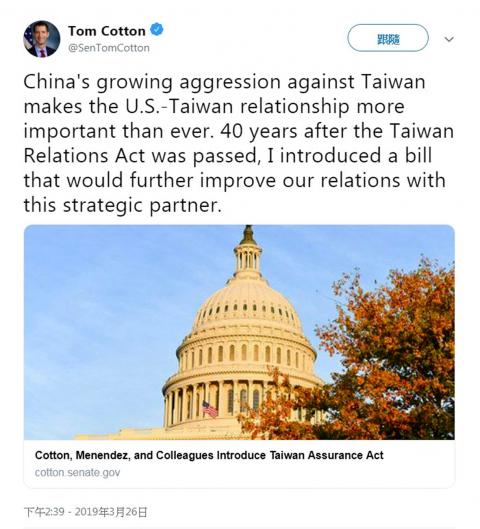A group of US senators across party lines on Tuesday introduced a bill that would cement two-way ties with Taiwan and support its international presence, as the Taiwan Relations Act is next month to mark its 40th anniversary.
US Senator Tom Cotton said in a statement that he has introduced legislation with five other senators that “would enhance the US-Taiwan relationship and bolster Taiwan’s participation in the international community.”
“Taiwan is a vital democratic partner of the US. Forty years after the Taiwan Relations Act was signed into law, our bilateral ties should reflect this reality,” Cotton said.

Screengrab from Tom Cotton’s Twitter feed
Called the Taiwan Assurance Act, the legislation “would deepen bilateral security, economic and cultural relations, while also sending a message that China’s aggressive cross-strait behavior will not be tolerated,” he said.
US Senator Robert Menendez, a bill cosponsor, said that he believes the US Congress needs to make a statement of support for Taiwan 40 years after the Taiwan Relations Act was passed in April 1979.
“It is critical that congress speak with one voice about the importance of maintaining Taiwan’s diplomatic space, deepening our ties with Taipei and assuring the people of Taiwan have a voice in determining their own future,” Menendez said.
Another cosponsor, US Senator Marco Rubio, said that the US must continue to enhance its strategic relationship with Taiwan against an increasingly aggressive China.
“Taiwan is an important democratic partner whose security is critical to advancing America’s national security interests in the Indo-Pacific [region],” he said.
The Taiwan Assurance Act would require the US president to review the US Department of State’s guidelines on relations with Taiwan and direct the US secretary of defense to work to include Taiwan in bilateral and multilateral military training exercises, the statement said.
It would also mandate that a flag or general officer serve as the US defense attache in Taipei and that the US would continue to push for Taiwan’s meaningful participation in international organizations.
The bill expresses congressional support for Taiwan’s asymmetric defense strategy, regular US arms sales to Taiwan and the resumption of bilateral trade talks between the US and Taiwan.
To become law, the measure needs to pass the Senate and the House of Representatives, and be signed into law by US President Donald Trump.
Its passage would likely rankle Beijing as the US and China are edging toward a possible deal to ease a months-long tariff dispute.
US Representative Michael McCaul said he plans to introduce companion legislation in the House.
Additional reporting by Reuters

MAKING WAVES: China’s maritime militia could become a nontraditional threat in war, clogging up shipping lanes to prevent US or Japanese intervention, a report said About 1,900 Chinese ships flying flags of convenience and fishing vessels that participated in China’s military exercises around Taiwan last month and in January last year have been listed for monitoring, Coast Guard Administration (CGA) Deputy Director-General Hsieh Ching-chin (謝慶欽) said yesterday. Following amendments to the Commercial Port Act (商港法) and the Law of Ships (船舶法) last month, the CGA can designate possible berthing areas or deny ports of call for vessels suspected of loitering around areas where undersea cables can be accessed, Oceans Affairs Council Minister Kuan Bi-ling (管碧玲) said. The list of suspected ships, originally 300, had risen to about

DAREDEVIL: Honnold said it had always been a dream of his to climb Taipei 101, while a Netflix producer said the skyscraper was ‘a real icon of this country’ US climber Alex Honnold yesterday took on Taiwan’s tallest building, becoming the first person to scale Taipei 101 without a rope, harness or safety net. Hundreds of spectators gathered at the base of the 101-story skyscraper to watch Honnold, 40, embark on his daredevil feat, which was also broadcast live on Netflix. Dressed in a red T-shirt and yellow custom-made climbing shoes, Honnold swiftly moved up the southeast face of the glass and steel building. At one point, he stepped onto a platform midway up to wave down at fans and onlookers who were taking photos. People watching from inside

Japan’s strategic alliance with the US would collapse if Tokyo were to turn away from a conflict in Taiwan, Japanese Prime Minister Sanae Takaichi said yesterday, but distanced herself from previous comments that suggested a possible military response in such an event. Takaichi expressed her latest views on a nationally broadcast TV program late on Monday, where an opposition party leader criticized her for igniting tensions with China with the earlier remarks. Ties between Japan and China have sunk to the worst level in years after Takaichi said in November that a hypothetical Chinese attack on Taiwan could bring about a Japanese

The WHO ignored early COVID-19 warnings from Taiwan, US Deputy Secretary of Health and Human Services Jim O’Neill said on Friday, as part of justification for Washington withdrawing from the global health body. US Secretary of State Marco Rubio on Thursday said that the US was pulling out of the UN agency, as it failed to fulfill its responsibilities during the COVID-19 pandemic. The WHO “ignored early COVID warnings from Taiwan in 2019 by pretending Taiwan did not exist, O’Neill wrote on X on Friday, Taiwan time. “It ignored rigorous science and promoted lockdowns.” The US will “continue international coordination on infectious